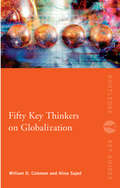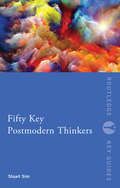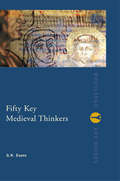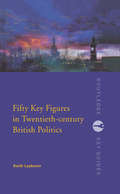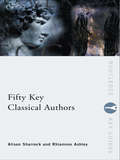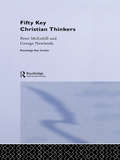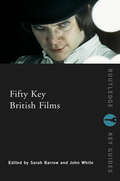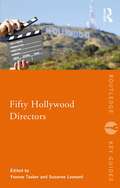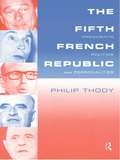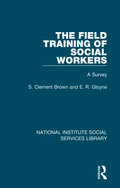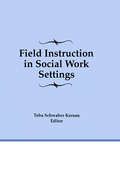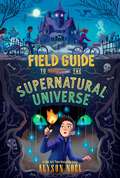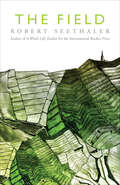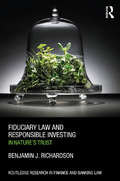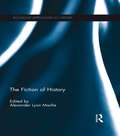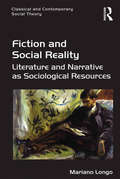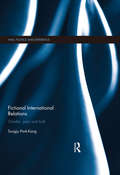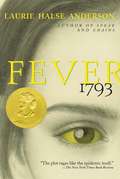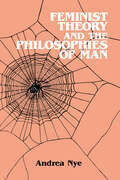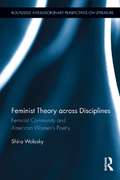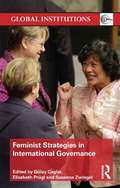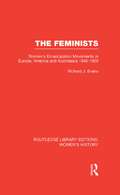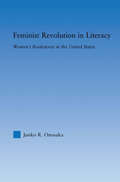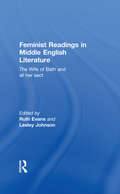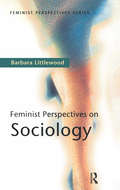Special Collections
Benetech’s Global Certified Accessible Titles
Description: Benetech’s GCA program is the first independent third-party EPUB certification to verify ebook accessibility. By creating content that is born accessible, publishers can meet the needs of all readers. Learn more: https://bornaccessible.benetech.org/
- Table View
- List View
Fifty Key Thinkers on Globalization
by Alina Sajed and William ColemanFifty Key Thinkers on Globalization is an outstanding guide to often-encountered thinkers whose ideas have shaped, defined and influenced this new and rapidly growing field. The authors clearly and lucidly survey the life, work and impact of fifty of the most important theorists of globalization including: Manuel Castells Joseph Stiglitz David Held Jan Aart Scholte Each thinker’s contribution to the field is evaluated and assessed, and each entry includes a helpful guide to further reading. Fully cross-referenced throughout, this remarkable reference guide is essential reading for students of politics and international relations, economics, sociology, history, anthropology and literary studies.
Fifty Key Postmodern Thinkers
by Stuart SimPostmodernism is an important part of the cultural landscape which continues to evolve, yet the ideas and theories surrounding the subject can be diverse and difficult to understand. Fifty Postmodern Thinkers critically examines the work of fifty of the most important theorists within the postmodern movement who have defined and shaped the field, bringing together their key ideas in an accessible format. Drawing on figures from a wide range of subject areas including literature, cultural theory, philosophy, sociology and architecture those covered include: John Barth Umberto Eco Slavoj Zizek Cindy Sherman John Cage Jean-Francois Lyotard Charles Jencks Jacques Derrida Homi K. Bhabha Quentin Tarantino Each entry examines the thinkers’ career, key contributions and theories and refers to their major works. A valuable resource for those studying postmodern ideas at both undergraduate and postgraduate level, this text will appeal across the humanities and social sciences.
Fifty Key Medieval Thinkers
by G.R. EvansFocussing on individuals whose ideas shaped intellectual life between 400 and 1500, Fifty Key Medieval Thinkers is an accessible introduction to those religious, philosophical and political concepts central to the medieval worldview. Including such diverse figures as Bede and Wyclif, each entry presents a biographical outline, a list of works and a summary of their main theories, alongside suggestions for further reading. Chronologically arranged, and with an introductory essay which presents important themes in context, this volume is an invaluable reference tool for all students of Medieval Europe.
Fifty Key Figures in Twentieth Century British Politics
by Keith LaybornThis guidebook provides a complete overview of the lives and influence of fifty major figures in modern British political history. Reflecting the changes within British society and politics over the past century, the entries chart the development of key contemporary issues such as women's rights, immigration and the emergence of New Labour. Figures covered include:* Winston Churchill* Tony Blair* Emmeline Pankhurst* David Lloyd George* Margaret Thatcher* John Maynard Keynes* Enoch Powell* Barbara CastleWith cross-referenced entries and helpful suggestions for further reading, this book is an essential guide for all those with an interest in understanding the dominating issues of modern British politics.
Fifty Key Classical Authors
by Alison Sharrock and Rhiannon AshleyA chronological guide to influential Greek and Roman writers, Fifty Key Classical Authors is an invaluable introduction to the literature, philosophy and history of the ancient world. Including essays on Sappho, Polybius and Lucan, as well as on major figures such as Homer, Plato, Catullus and Cicero, this book is a vital tool for all students of classical civilization.
Fifty Key Christian Thinkers
by George Newlands and Peter McEnhillFifty Key Christian Thinkers provides both valuable information and stimulating debate on the lives and work of fifty of the most important Christian theologians. This guide provides an overview of Christian theology from the emergence of the faith 2000 years ago to the present day. Among the figures profiled in this accessible guide are:* St Paul * Barth * Aquinas * Boethius* Niebuhr * Calvin* Luther * Feuerbach* Kierkegaard * Origen
Fifty Key British Films
by John White and Sarah BarrowIn Fifty Key British Films, Britain's best known films such as Clockwork Orange, The Full Monty and Goldfinger are scrutinised for their outstanding ability to articulate the issues of the time. This is essential reading for anyone interested in quality, cult film.
Fifty Hollywood Directors
by Yvonne Tasker and Suzanne LeonardFifty Hollywood Directors introduces the most important, iconic and influential filmmakers who worked in Hollywood between the end of the silent period and the birth of the blockbuster. By exploring the historical, cultural and technological contexts in which each director was working, this book traces the formative period in commercial cinema when directors went from pioneers to industry heavyweights. Each entry discusses a director’s practices and body of work and features a brief biography and suggestions for further reading. Entries include: Frank Capra Cecil B DeMille John Ford Alfred Hitchcock Fritz Lang Orson Welles DW Griffith King Vidor This is an indispensible guide for anyone interested in film history, Hollywood and the development of the role of the director.
The Fifth French Republic
by Philip ThodyThe Fifth French Republic is a study of modern French politics and history, discussing the five presidents who span from 1959 to the present--Charles de Gaulle, Georges Pompidou, Valry Giscard d'Estang, Fran5~ois Mitterand and Jacques Chirac.Philip Thody examines the importance of the similarities between the five men for an understanding of the general and political culture of France; the similarities and differences in the foreign policies pursued by the five presidents, including anti-Americanism; France's role in the European Union and her attitude to the Cold War; French domestic policies and administrative practices, attempts to decentralize the state, the role of the French civil service, the problem of immigration and the rise of the National Front.
The Field Training of Social Workers
by S. Clement Brown and E. R. GloyneFirst published in 1966, the original blurb read: Learning with the help of skilled practitioners is as essential in training for social work as for medicine and teaching. Where do students of social work go for field training and why? What is it hoped that they will learn through their experience? What responsibilities are they given and who guides their learning? Partnership between social workers and academic staff in working out these questions is considered at a critical time in the changing perspectives and expansion of social services. The staff of colleges and social agencies, students, and professional organizations have helped to produce the facts and views on which this survey is based.
Field Instruction in Social Work Settings
by Toba Schwaber KersonField Instruction in Social Work Settings explores the relationship between field instruction and the setting in which it occurs. The book asserts that certain aspects of social work, including laws, funding, political climate, organizational policies, and values, affect the relationship between student and field instructor and shape teaching and learning. The book explores dimensions of the student/field instructor relationship such as goals and expectations, development of professional identity, uses of the self, issues of diversity, authority, dependency, autonomy, value dilemmas, and the structure of supervision. It presents a framework for teaching field instruction and uses the framework to explore its relevance, meaning, and use in the following settings: perinatal AIDS program public child welfare child advocacy agency public school occupational health and safety project family service psychiatric hospital case management program for the elderly day center for the elderlyField Instruction in Social Work Settings is the only book available relating field instruction to the specific context in which it occurs. It recognizes the social work field’s diminished budget and increased demands and points out the critical necessity of students learning to address and manage policy and organizational issues as they develop their social work skills. This book is an aid to field instructors balancing increases in enrollment and curriculum content and decreases in placements and budgets. It integrates all of these concerns with field practice and seeks to provide a model for those working in the field as instructors and students. Field Instruction in Social Work Settings applies classroom material to social work settings and emphasizes the value of field instruction by relating it to the branches of child welfare, mental health, and health care. It allows the reader to integrate social work policy and advocacy with field work, and it provides the reader with an appreciation of how social work and field instruction can work together directly.
Field Guide to the Supernatural Universe
by Alyson NoëlStranger Things meets Sideways Stories from Wayside School in this quirky supernatural middle grade novel about a boy on an unlikely quest to uncover an enchanted book to defeat an unearthly nemesis—from New York Times bestselling author Alyson Noël.When he first started seeing ghosts, Max mistakenly assumed everyone else could see them, too. Now, after years of being blamed for the pranks of mischievous spirits, Max is determined to do whatever it takes to make himself normal. But when he&’s sent to spend the summer with his eccentric grandfather, Ramhart, being normal becomes impossible. Here in Glimmerville, bakeries sell enchanted pies, the lake is infested with mermaids, the town&’s beloved ghosts roam free, and Ramhart himself is celebrated as the world&’s most famous monster hunter. At first, all Max wants is to survive the summer, but the more time he spends in Glimmerville, the more he starts to wonder if he&’s finally found a place where he can truly be himself. But when a supernatural attack steals Ramhart&’s soul, Max—with the help of a few new friends—must go on a quest to find his grandfather&’s renowned Field Guide, an enchanted book that contains all the knowledge Ramhart has gathered about defeating unearthly nemeses. And if they don&’t find the book fast, Glimmerville will crumble into chaos, and Max will lose the only person who&’s ever made him feel at home.
The Field
by Robert SeethalerFrom Robert Seethaler, the International Booker Prize finalist for A Whole Life and bestselling author of The Tobacconist, comes a tale of life and death and human connection, told through the voices of those who have passed on. The Field is the oldest part of the cemetery in Paulstadt, where some of the small town’s most outspoken residents can be found. From their graves, they tell stories. Some recall just a moment — perhaps the one in which they left this world, perhaps the one they now realize changed the course of their life forever. Some remember all the people they’ve been with, or the only person they ever loved. This chorus of voices — young, old, rich, poor — builds a picture of a community, seen from below ground. The streets of the sleepy provincial town are given shape and meaning by those who lived, loved, worked, mourned, and died there. The Field is a constellation of human lives — each one different yet connected to countless others — that shows how existence, for all its fleetingness, still has profound meaning.
Fiduciary Law and Responsible Investing
by Benjamin J. RichardsonThis book is about fiduciary law’s influence on the financial economy’s environmental performance, focusing on how the law affects responsible investing and considering possible legal reforms to shift financial markets closer towards sustainability. Fiduciary law governs how trustees, fund managers or other custodians administer the investment portfolios owned by beneficiaries. Written for a diverse audience, not just legal scholars, the book examines in a multi-jurisdictional context an array of philosophical, institutional and economic issues that have shaped the movement for responsible investing and its legal framework. Fiduciary law has acquired greater influence in the financial economy in tandem with the extraordinary recent growth of institutional funds such as pension plans and insurance company portfolios. While the fiduciary prejudice against responsible investing has somewhat waned in recent years, owing mainly to reinterpretations of fiduciary and trust law, significant barriers remain. This book advances the notion of ‘nature’s trust’ to metaphorically signal how fiduciary responsibility should accommodate society’s dependence on long-term environmental well-being. Financial institutions, managing vast investment portfolios on behalf of millions of beneficiaries, should manage those investments with regard to the broader social interest in sustaining ecological health. Even for their own financial self-interest, investors over the long-term should benefit from maintaining nature’s capital. We should expect everyone to act in nature’s trust, from individual funds to market regulators. The ancient public trust doctrine could be refashioned for stimulating this change, and sovereign wealth funds should take the lead in pioneering best practices for environmentally responsible investing.
The Fiction of History
by Alexander Lyon MacfieThe Fiction of History sets out a number of themes in the relationship between history and fiction, emphasising the tensions and dilemmas created in this relationship and examining how various writers have dealt with these. In the first part, two chapters discuss the philosophy behind the connection between fiction and history, whether history is fiction, and the distinction between the past and history. Part two goes on to discuss the relationship between history and literature using case studies such as Virginia Woolf and Charles Dickens. Part three looks at television and film (as well as other media) through case studies such as the film Welcome to Sarajevo and Soviet and Australian films. Part four considers a particular theme that has prominence in both history and literature, postcolonial studies, focusing on the issues of fictions of nationhood and civilization and the historical novel in postcolonial contexts. Finally, the fifth section comprises two interviews with novelists Penelope Lively and Adam Thorpe and discusses the ways in which their works explore the nature of history itself.
Fiction and Social Reality
by Mariano LongoIn spite of their differing rhetorics and cognitive strategies, sociology and literature are often concerned with the same objects: social relationships, action, motivation, social constraints and relationships, for example. As such, sociologists have always been fascinated with fictional literature. This book reinvigorates the debate surrounding the utility of fiction as a sociological resource, examining the distinction between the two forms of writing and exploring the views of early sociologists on the suitability of subjecting literary sources to sociological analysis. Engaging with contemporary debates in this field, the author explores the potential sociological use of literary fiction, considering the role of literature as the exemplification of sociological concepts, a non-technical confirmation of theoretical insights, and a form of empirical material used to confirm a set of theoretically oriented assumptions. A fascinating exploration of the means by which the sociological eye can be sharpened by engagement with literary sources, Fiction and Social Reality offers a set of methodological principles according to which literature can be examined sociologically. As such, it will appeal to scholars of sociology and literary studies with interests in research methods and interdisciplinary approaches to scholarly research.
Fictional International Relations
by Sungju Park-KangThis book proposes the idea of fictional International Relations (IR) and engages with feminist IR by contextualising the case of a woman spy in Korea in the Cold War. Fictional imagination and feminist IR encourage one to go beyond conventional or standard ways of thinking; it reshapes taken-for-granted interpretations and assumptions. This takes the view that a dominant narrative of events might be reconstructed as a different kind of story, once events are placed within a wider temporal approach. The case of the woman Korean secret agent- who reportedly bombed a South Korean plane (Korean Airlines (KAL) Flight 858) under the instruction from the North Korean leadership to disrupt the Seoul Olympic Games- is chosen to serve as an effective example of fictional IR and feminist IR scholarship, which can be investigated through the research puzzles concerning gender, pain and truth. Fictional International Relations has three main objectives. First, it investigates the way in which fiction-writing can become a method for dealing with data problems and contingency in IR. Second, the book examines how gender, pain and truth operate or interact in the case of the Korean spy and how this observation can strengthen feminist IR in terms of intersectionality. Finally, the author goes on to explore why this case has been so difficult to study openly and thoroughly. The aim of the book is not to refute the official findings; the point is to unpack complex dynamics surrounding truth—more specifically how the official account has been executed as ‘the’ truth—based on a feminist-informed investigation. This book will be of interest to students of IR theory, critical security studies, Cold War studies, gender studies and Asian studies.
Fever 1793
by Laurie Halse AndersonIt's late summer 1793, and the streets of Philadelphia are abuzz with mosquitoes and rumors of fever. Down near the docks, many have taken ill, and the fatalities are mounting. Now they include Polly, the serving girl at the Cook Coffeehouse. But fourteen-year-old Mattie Cook doesn't get a moment to mourn the passing of her childhood playmate. New customers have overrun her family's coffee shop, located far from the mosquito-infested river, and Mattie's concerns of fever are all but overshadowed by dreams of growing her family's small business into a thriving enterprise. But when the fever begins to strike closer to home, Mattie's struggle to build a new life must give way to a new fight-the fight to stay alive.
Feminist Theory and the Philosophies of Man
by Andrea NyeFirst published in 1990. Routledge is an imprint of Taylor & Francis, an informa company.
Feminist Theory Across Disciplines
by Shira WoloskyDefying traditional definitions of public and private as gendered terms, and broadening discussion of women’s writing in relation to feminist work done in other fields, this study addresses American women’s poetry from the seventeenth to late-twentieth century. Engaging the fields of literary criticism, anthropology, psychology, history, political theory, religious culture, cultural studies, and poetics, this study provides entry into some of the founding feminist discussions across disciplines, moving beyond current scholarship to pursue an interpretation of feminism’s defining interests and assumptions in the context of women’s writing. The author emphasizes and explores how women’s writing expresses their active participation in community and civic life, emerging from and shaping a woman’s selfhood as constituted through relationships, not only on the personal level, but as forming community commitments. This distinctive formation of the self finds expression in women’s voices and other poetic forms of expression, with the aesthetic power of poetry itself bringing different arenas of human experience to bear on each other in mutual interrogation and reflection. Women poets have addressed the public world, directly or through a variety of poetic structures and figures, and in doing so they have defined and expressed specific forms of selfhood engaged in and committed to communal life.
Feminist Strategies in International Governance
by Susanne Zwingel and Gülay Caglar and Elisabeth PrüglThe struggle for women’s rights and to overcome gender oppression has long engaged the efforts of inter-governmental and non-governmental organizations. Feminist Strategies in International Governance provides a new introduction to the contemporary forms of this struggle. It brings together the voices of academics and practitioners to reflect in particular on the effectiveness of human rights strategies and gender mainstreaming. It covers three international issue areas in which feminists currently seek change: women’s human rights and violence against women; the participation of women in peace-making and their protection during conflict; and the gendered effects of development, economic and financial governance. The book combines a critical reflection on the current state of feminist politics with an introduction to urgent issues on the contemporary international agenda. In addition, the book draws on innovative conceptualizations from constructivism in international relations, legal anthropology and discourse theory to provide new framings of current feminist struggles. Offering an accessible guide to the engendering of international governance and examining the challenges for international feminist politics in the future, this work will be of great interest to students and scholars of international organizations, gender politics and global governance.
The Feminists
by Richard J. EvansOriginally published in 1977, this book brings together what is known about liberal feminist and socialist movements for the emancipation of women all over the world in the nineteenth and early twentieth centuries. It deals not only with Britain and the United States but also with Australia, New Zealand, France, Germany, Russia, Austria-Hungary and the Scandinavian countries. The chapters trace the origins, development, and eventual collapse of these movements in relation to the changing social formations and political structures of Europe, America and Australasia in the era of bourgeois liberalism. The first part of the book discusses the origins of feminist movements and advances a model or ‘ideal type’ description of their development. The second part then takes a number of case studies of individual feminist movements to illustrate the main varieties of organised feminism and the differences from country to country. The third part looks at socialist women’s movements and includes a study of the Socialist Women’s International. A final part touches on the reason for the eclipse of women’s emancipation movements in the half-century following the end of the First World War, before a general conclusion pulls together some of the arguments advanced in earlier chapters and attempts a comparison between these feminist movements of 1840-1920 and the Women’s Liberation Movement.
Feminist Revolution in Literacy
by Junko OnosakaThis book examines the history of women's bookstores in the US from the 1970s to the 1990s. It establishes that women's bookstores played an important role in feminism by enabling the dissemination of women's voices and thereby helping to sustain and enrich the women's movement. They improved women's literacy - their abilities to read, write, publish, and distribute women's voices and visions - and helped women to instigate a feminist revolution in literacy.
Feminist Readings in Middle English Literature
by Ruth Evans and Lesley JohnsonThis volume, designed with the student reader in mind, is an indispensable blend of key essays in the field with specially commissioned new material by feminist scholars from the UK and the US. It includes a diversity of texts and feminist approaches, a substantial and very illuminating introduction by the editors, and an annotated list of Further Reading, offering preliminary guidance to the reader approaching the topic of gender and medieval literature for the first time. Works and writers covered include: * Chaucer * Margery Kempe * Christine de Pisan * The Katherine group of Saints' Lives * Langland's Piers Plowman * Medieval cycle drama Students of both medieval and feminist literature will find this an essential work for study and reference.
Feminist Perspectives on Sociology
by Barbara LittlewoodThe Feminist Perspectives Series seeks to provide concise, accessible and engaging introductions to key feminist topics and debates. The texts in the series are designed to be used on a wide range of courses touching feminist issues and are written by experienced teachers who are also well known in their respective fields. Each book in the series includes the most up-to-date statistics, research data, key sources and suggestions for further reading.Feminist Perspectives on Sociology examines how sociology has been transformed under the influence of feminism in recent years. This transformation consists both of a critique of established areas and the opening up of new ones. Areas and issues covered include approaches to knowledge and research, patriarchal relations, work in and outside the home, body politics, sport and fitness, migration, violence, the state, and globalisation. The book also reviews a range of ‘post’ perspectives and arguments including postmodernism, postcolonialism and postfeminism. Feminism is also a transformative social movement. Its political impact, from local to transnational levels, has to be taken into account in assessing developments in sociology, providing it with a connection between research and action.Key featuresProvides a comprehensive and accessible introduction to feminist perspectives in sociology Discusses and assesses sociological and feminist theories in relation to case studies Covers a wide range of current issues that will interest readers from many disciplinary backgrounds Includes end of chapter summaries, suggestions for further reading and a glossary of key termsBarbara Littlewood is Lecturer in Sociology, University of Glasgow.
